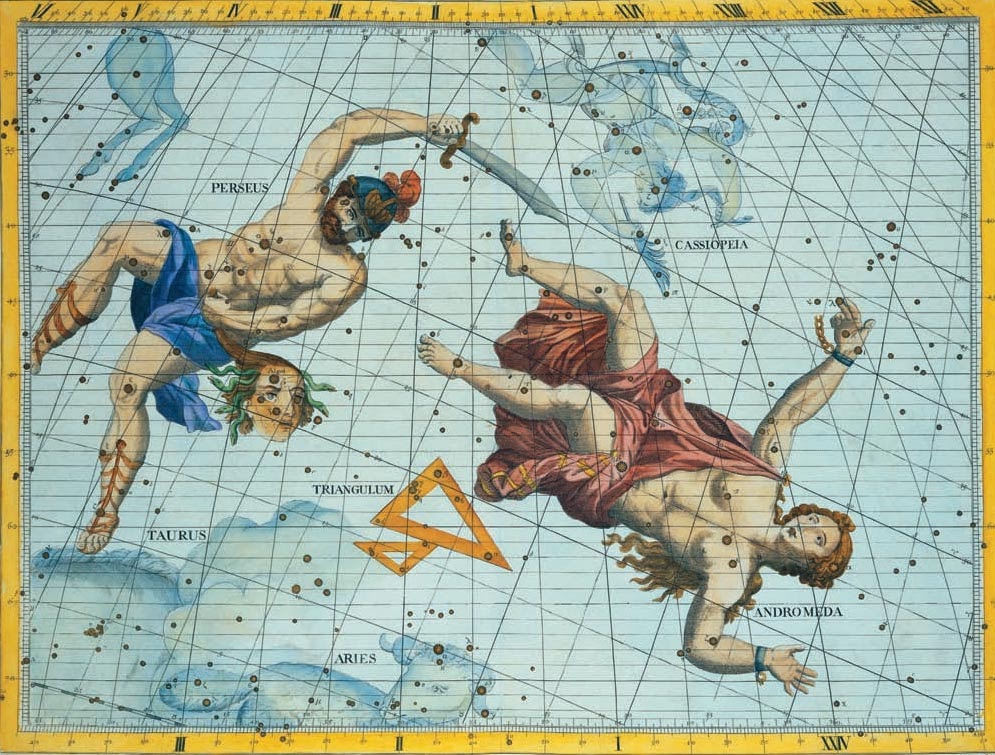Andromeda
The princess who was rescued by Perseus, overturning her unjust condemnation to death by the sea monster.

Andromeda plays an important role in the Perseus myth. Her father was Cepheus, king of Ethiopia and her mother Cassiopea, who was famous throughout Greece for her beauty.
Andromeda ended up being as beautiful as her mother. Cassiopea, who was always bragging for her appearance, was too proud of her daughter's beauty. One day, the often jealous goddess Hera heard Cassiopea boast that her daughter and her were more beautiful than all the Nereids, the nymphs of the sea who were the daughters of God Neptune. Greek mythology is full of stories of gods who punish the sin of hubris or pride in people, and Cassiopea was to be an example to avoid.
Hera and the Nereids complained to Poseidon, who sent a flood to destroy Ethiopia. He also sent a dreadful female monster of the sea to haunt the coasts of the country. The creature was devastating and had an insatiable appetite for the human flesh.
Cepheus, after great consideration, asked for an oracle, who told him that the only way to get rid of the sea monster forever was to sacrifice his daughter Andromeda. Cepheus protested to the gods, but they were adamant that this was the only way to be redeemed for the vanity of Cassiopea.
Andromeda was chained to a rock overlooking the sea, naked, wearing only her jewels, as the gods commanded. As she stood there, striking her tragic fate, she saw a young man passing by flying and tearing the air apart with a pair of winged sandals.

This was Perseus, the hero who had just killed the mermaid Medusa, with a magical sharp sword returning to Argos with the monster's head on a ribbon. The bag, the sickle, the winged sandals, and a magic helmet that made him invisible had been given to him by the gods, to use them to kill the Gorgon, whose gaze turned anyone who looked into stone.
Perseus was surprised to see a beautiful woman chained to a rock. As he descended from the sky to take a closer look, he saw Andromeda's parents in despair watching her from the shore. They promised him he could marry Andromeda if he managed to save her from the monster. They did not finish their words, and the monster emerged from the sea and moved to Andromeda with its mouth open, ready to swallow her.
Perseus immediately flew in the air, pulled out Medusa's head from his bag and turned it over to the monster. The look of Medusa turned to stone the monster who stood unable to cope with the mermaid curse. Perseas then freed Andromeda from her chains and led her back to her parents who were crying with joy. Lastly, he sacrificed to all gods as a repentance for refusing them revenge. Poseidon later transformed the dead body of the monster into the first coral of the sea.
Andromeda, deeply impressed by the bravery of Perseus, fell in love with him. She asked her parents to let her marry him right away. They agreed with reluctance, but then Cassiopea secretly spoke to Agenor, who was already engaged to Andromeda, but had done nothing to help her when she was in grave danger. On the wedding day, Agenor arrived uninvited with a group of his friends, interrupting the ceremony and demanding that Andromeda canceled the union with Perseus. Cepheus and Cassiopea took the part of Agenor because he was the prince of a strong neighboring kingdom. When Perseus refused to put an end to the marriage, Agenor tried to take Andromeda away by force, while his friends launched a fierce attack against Perseus with their weapons.

Perseus had predicted the betrayal of Cassiopeia, and so he brought with him the magic bag containing the head of Medusa. He took it out and used it to turn Agenor and his friends to stone. He did the same to Cepheus and Cassiopea, so Cassiopea was punished for the sin of pride.
The gods decided to exemplify Cepheus and Cassiopea. So they set them up among the stars as constellations and as a warning to the wicked. At certain times of the year, the constellation of Cassiopea is turning upside down, so it is said to be punished even more.
As for Andromeda, Perseus flew back to Argos holding her in his arms. He then won his kingdom from his uncle, who had usurped the throne in his absence, and had many more adventures. Perseus and Andromeda eventually reigned in Tiryns, an ancient city in the Peloponnese, and their children ruled after them
When they died, Perseus and Andromeda also became constellations, but in their case, it was a great honor, not a terrible warning. One of the most well-known features of the Andromeda constellation is the nebula of Andromeda, the closest galaxy to our own.